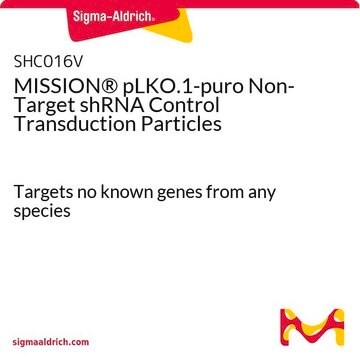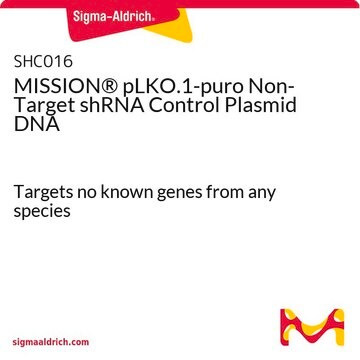SHC016H
MISSION® pLKO.1-puro Non-Target shRNA Control Transduction Particles, High Titer
Targets no known genes from any species
동의어(들):
MISSION®, MISSION® Control Transduction Particles, negative control, negative shRNA control, non-target control, non-target shRNA, non-target shRNA control, shRNA control
로그인조직 및 계약 가격 보기
모든 사진(1)
About This Item
UNSPSC 코드:
41106609
NACRES:
NA.51
추천 제품
일반 설명
The MISSION pLKO.1-puro Non-Target shRNA Control Transduction Particles, High Titer contain an shRNA insert that does not target any known genes from any species, making it useful as a negative control in experiments using the MISSION shRNA library clones. This allows one to examine the effect of transduction of a short-hairpin on gene expression and interpret the knockdown effect seen with shRNA clones. Ampicillin and puromycin antibiotic resistance genes provide selection in bacterial or mammalian cells respectively. In addition, self-inactivating replication incompetent viral particles can be produced in packaging cells (HEK293T) by co-transfection with compatible packaging plasmids.
High titer virus is useful when performing in vivo research.
High titer virus is useful when performing in vivo research.
When conducting experiments using MISSION® shRNA clones, the proper controls should be a key element of your experimental design to allow for accurate interpretation of knockdown results. The MISSION Control Transduction Particles are a critical positive control to monitor transduction efficiency.
To see more application data, protocols, vector maps visit sigma.com/shrna.
To see more application data, protocols, vector maps visit sigma.com/shrna.
애플리케이션
To see more application data, protocols, vector maps visit sigma.com/shrna.
법적 정보
MISSION is a registered trademark of Merck KGaA, Darmstadt, Germany
추천
제품 번호
설명
가격
Storage Class Code
12 - Non Combustible Liquids
WGK
WGK 3
Flash Point (°F)
Not applicable
Flash Point (°C)
Not applicable
시험 성적서(COA)
제품의 로트/배치 번호를 입력하여 시험 성적서(COA)을 검색하십시오. 로트 및 배치 번호는 제품 라벨에 있는 ‘로트’ 또는 ‘배치’라는 용어 뒤에서 찾을 수 있습니다.
이미 열람한 고객
Najim Lahrouchi et al.
Nature communications, 10(1), 1180-1180 (2019-03-14)
A failure in optic fissure fusion during development can lead to blinding malformations of the eye. Here, we report a syndrome characterized by facial dysmorphism, colobomatous microphthalmia, ptosis and syndactyly with or without nephropathy, associated with homozygous frameshift mutations in
자사의 과학자팀은 생명 과학, 재료 과학, 화학 합성, 크로마토그래피, 분석 및 기타 많은 영역을 포함한 모든 과학 분야에 경험이 있습니다..
고객지원팀으로 연락바랍니다.






